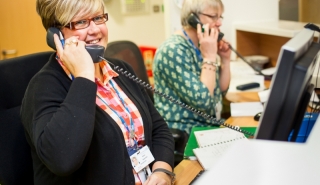Laboratory Medicine
General Information / High Risk/Danger of Infection Samples
There is an absolute requirement that high risk samples are labelled as such before transport to the laboratory. The HSE advise the provision of sufficient information on specimen request forms to staff in clinical diagnostic laboratories to enable them to apply the correct safety measures to control the risk. The lack of sufficient relevant clinical details provided on specimen request forms can result in samples being handled at the wrong biological containment level with resulting increased risk of infection to laboratory staff.
Samples must be considered High Risk if the patient has, or is suspected of having:
| CJDv | Hep B | Hep C | HIV | TB | SARS-CoV-2 |
| Any other disease classed as category 3 or above |
| Samples from patients with jaundice of unknown origin and patients known to engage in high risk activities, such as IV drug abuse, and or those with recent history of relevant foreign travel that may increase likelihood of exotic agents being present must also be considered high risk. |
Blood from these patients should normally be taken by medical staff. If Phlebotomists are asked to take blood they must be informed of the situation. This is the personal responsibility of the doctor making the request. If Phlebotomists are asked to take blood from patients being barrier nursed they must be informed of the situation.
Requests made by order comms electronic requesting
The High Risk box must be ticked when making the request on Ordercomms. This ensures a subtle format change to the request form which, along with the use of double bagging, provides all the labelling required.
Requests made to Microbiology
For all high risk samples the high risk box on the Microbiology request form must be ticked. Remember to complete the Microbiology request form with all patient details as usual. The sample should be double bagged by placing it inside a second Microbiology request form bag.
Other requests
Requests for departments other than Microbiology, (and where no Order Comms requesting is available), must clearly indicate the infection risk of the patient on the request card. New request forms are in process for other disciplines which will follow the Microbiology approach in due course. The sample should be double bagged by placing it inside a second request form bag.
Radioactive Samples
Biological samples (blood, urine, tissues or organs) obtained from patients who have recently received radioactive materials for the purposes of therapy or diagnosis are likely to be radioactive. In general, such samples will contain very low levels of radioactivity and consequently do not pose a significant risk to staff provided Standard Precautions are applied.
The procedure (LM-SOP-RADIOACTIVE - Click Here) has been written to comply with the Ionising Radiation Regulations 1999 and then Ionising Radiation (Medical Exposure) Regulations 2000. The Environmental Permitting Regulations 2010 for Medicine (Administration of Radioactive Substances) Regulations 1978 and the Carriage of Good and Use of Transportable Pressure Equipment Regulations.
In all cases, the handling of radioactive biological samples should be performed with the aim of minimising risk. The period over which samples are required to be treated as radioactive will depend on the type of radioactive material administered, and guidelines on how long precautions need to be adopted after the radioactive administration will be advised by the department responsible for their administration.
Packaging and transport of high risk samples
All high risk samples must be double bagged and must NOT be transported using the vacuum tube system.
Enquiries
Any queries regarding high risk samples can be addressed to:
|
Dr D Hamilton Consultant Microbiologist |
Mrs Lisa Mead Microbiology Laboratory Manager |
Angela Too Laboratory Medicine H & S Lead |
Web Page 21 Last Updated: 06/09/22
Advice for Requesters - Cervical Cytology
How to Send Samples to the Lab
Advice for Requestors - Immunology
Advice for Requesters- Microbiology
Guidance on test interpretation- Clinical Biochemistry
Transportation of Samples and Postage
High Risk/Danger of Infection Samples
Request form and specimen labelling






